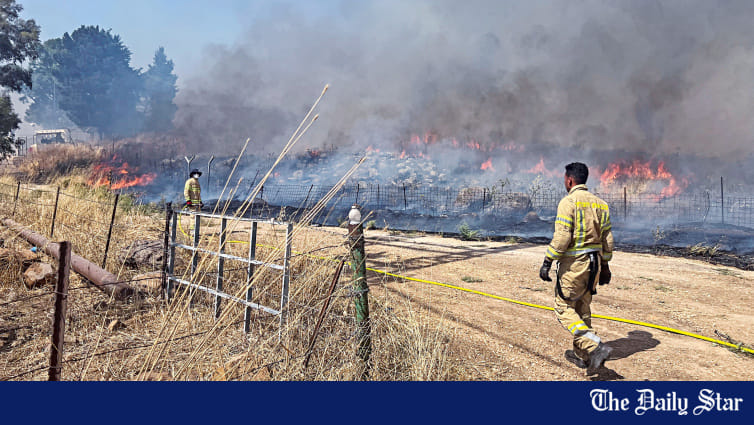Saif
Senior Member
- Messages
- 17,408
- Likes
- 8,374
- Nation

- Residence

- Axis Group


Many in Gaza back to eating ‘one meal per day’
Israel’s relentless bombardment and obstruction of humanitarian efforts are making it nearly impossible for aid agencies to reach starving Palestinians in the Gaza Strip.
ISRAELI OFFENSIVE IN PALESTINIAN ENCLAVE
Many in Gaza back to eating 'one meal per day'

Israel's relentless bombardment and obstruction of humanitarian efforts are making it nearly impossible for aid agencies to reach starving Palestinians in the Gaza Strip.
The flow of aid into Gaza has remained scarce, with many people now eating "only one meal per day", said Al Jazeera reporter Hind Khoudary.
"This is not only in the south, but also in the north" of Gaza, said Khoudary, adding that markets are largely empty and what food available is hard to afford for most people.
Khoudary has sent an update from Deir el-Balah's Al-Aqsa Hospital, where she said an extra emergency department has been opened to deal with the massive influx of injured patients.
The hospital, running on just one generator, remains flooded with sick and injured patients, and is performing surgeries on an "hourly basis", she said.
Israeli forces have withdrawn from the eastern part of Deir el-Balah, but civil defence teams were able to bring the bodies of five people who were killed in the area.
Israeli forces take a position in a street during a raid in the al-Faraa camp for Palestinian refugees near Tubas city in the occupied West Bank yesterday. Photo: AFP
There have been a couple of air strikes in the area after the Israeli forces withdrew, as well as intensive artillery shelling throughout the night.
Al Jazeera's Hani Mahmoud has spoken to residents of the Nuseirat refugee camp who witnessed the Israeli military's operation there on Saturday that killed and injured hundreds of Palestinians.
Anaas Alayan, one resident of the camp, said Israeli special forces committed mass "executions" on the street. "I went down to the street and found bodies everywhere," he told Al Jazeera.
The military, which rescued four Israeli captives during the operation, killed at least 274 Palestinians, including at least 64 children during the day-time assault, according to Gaza's Health Ministry.
The camp is now left with a "trail of destruction", according to Mahmoud.
With many of Gaza's water wells and pipelines destroyed in the offensive, accessing water has become a daily struggle for Palestinians in the coastal enclave.
Anas al-Jamal, a pregnant woman in the enclave, tells Al Jazeera she has to leave her home every day to search for water to carry home. "The water scarcity is severely affecting me because I'm supposed to rest and avoid strenuous physical activity," al-Jamal told Al Jazeera. "We're really struggling."
Israel's military offensive has killed at least 37,124 people in Gaza, also mostly civilians, according to the territory's health ministry.
The toll includes at least 40 deaths over the past 24 hours, the ministry said yesterday.
The offensive has brought widespread devastation to Gaza and displaced most of its 2.4 million inhabitants, reports AFP.
Many in Gaza back to eating 'one meal per day'
Israel's relentless bombardment and obstruction of humanitarian efforts are making it nearly impossible for aid agencies to reach starving Palestinians in the Gaza Strip.
The flow of aid into Gaza has remained scarce, with many people now eating "only one meal per day", said Al Jazeera reporter Hind Khoudary.
"This is not only in the south, but also in the north" of Gaza, said Khoudary, adding that markets are largely empty and what food available is hard to afford for most people.
Khoudary has sent an update from Deir el-Balah's Al-Aqsa Hospital, where she said an extra emergency department has been opened to deal with the massive influx of injured patients.
The hospital, running on just one generator, remains flooded with sick and injured patients, and is performing surgeries on an "hourly basis", she said.
Israeli forces have withdrawn from the eastern part of Deir el-Balah, but civil defence teams were able to bring the bodies of five people who were killed in the area.
Israeli forces take a position in a street during a raid in the al-Faraa camp for Palestinian refugees near Tubas city in the occupied West Bank yesterday. Photo: AFP
There have been a couple of air strikes in the area after the Israeli forces withdrew, as well as intensive artillery shelling throughout the night.
Al Jazeera's Hani Mahmoud has spoken to residents of the Nuseirat refugee camp who witnessed the Israeli military's operation there on Saturday that killed and injured hundreds of Palestinians.
Anaas Alayan, one resident of the camp, said Israeli special forces committed mass "executions" on the street. "I went down to the street and found bodies everywhere," he told Al Jazeera.
The military, which rescued four Israeli captives during the operation, killed at least 274 Palestinians, including at least 64 children during the day-time assault, according to Gaza's Health Ministry.
The camp is now left with a "trail of destruction", according to Mahmoud.
With many of Gaza's water wells and pipelines destroyed in the offensive, accessing water has become a daily struggle for Palestinians in the coastal enclave.
Anas al-Jamal, a pregnant woman in the enclave, tells Al Jazeera she has to leave her home every day to search for water to carry home. "The water scarcity is severely affecting me because I'm supposed to rest and avoid strenuous physical activity," al-Jamal told Al Jazeera. "We're really struggling."
Israel's military offensive has killed at least 37,124 people in Gaza, also mostly civilians, according to the territory's health ministry.
The toll includes at least 40 deaths over the past 24 hours, the ministry said yesterday.
The offensive has brought widespread devastation to Gaza and displaced most of its 2.4 million inhabitants, reports AFP.








